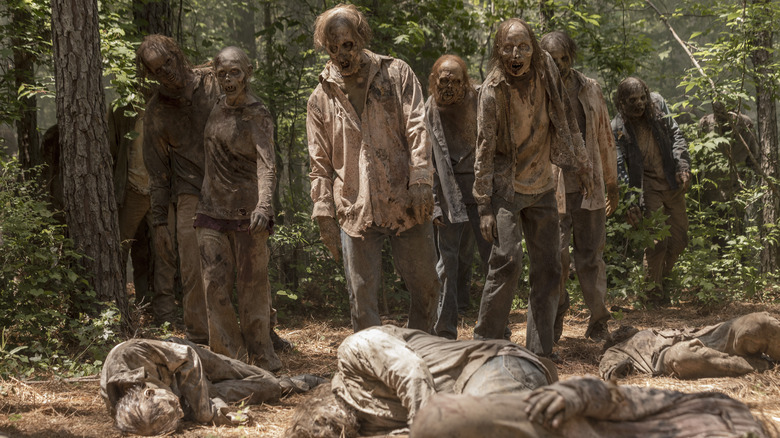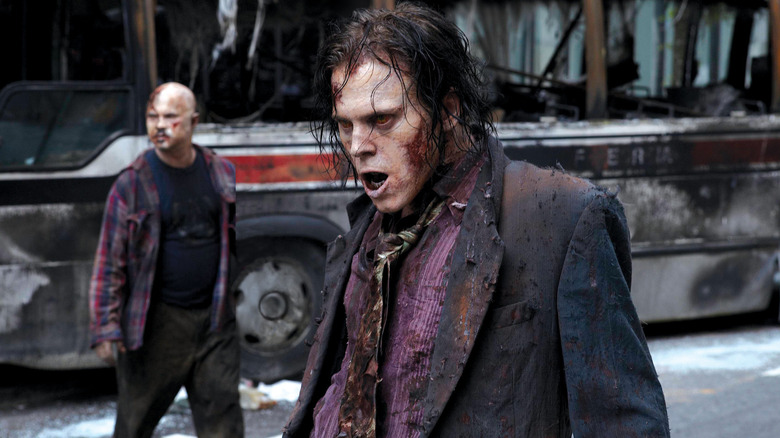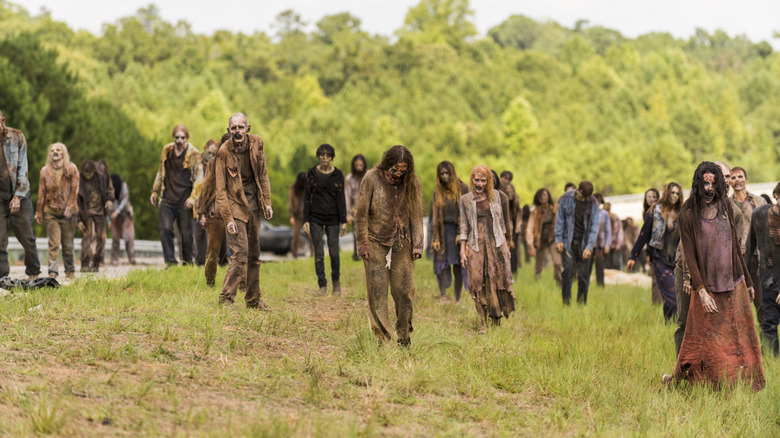Walking Dead Universe Extras Had To Pass 'Zombie School' First
"The Walking Dead," despite having a pretty significant drop-off following its highest of highs in its fifth season, was one of the biggest shows in the history of cable television. So much so that it spawned an entire universe worth of spin-offs, including "Fear the Walking Dead" and "Walking Dead: World Beyond," with plenty more on the way. In every show, the zombies, aka walkers, are an incredibly crucial element to nail down. It turns out, the crew behind the hit AMC series took that part of the job very seriously.
Visual effects legend Greg Nicotero was a big part of the show from the very beginning. When it came to the walkers, he actually put together a "Zombie School" ahead of each season. The idea was to find the best of the best walkers who could help make (or break) a scene. Speaking to CNN in 2012, Nicotero explained how it all works:
"At the beginning of each season, we have what we call 'Zombie School,' and what that does is give me an opportunity to audition anywhere from 150 to 200 extras. I grade them on two criteria: Look and performance. We have a visual aesthetic that is really important to the show and the zombies, that they look thin and gaunt and emaciated. We tend to go with thinner people who have a specific kind of bone structure, so when we put prosthetic on them, because makeup is an additive process, it doesn't look like we're building out their face too much. The second part of it is performance. The actor has to bring it to life. It's very important that our walkers are genuine and authentic."
The winners of the Zombie School
Making zombies for the show was no easy task. Greg Nicotero had a team of four full-time makeup artists who were dedicated to bringing the undead to life. Each walker took between and hour and an hour and a half to get camera ready. With some of the shots in the show, that's a lot of work. That's why this school was so important: they can't be worrying about someone getting it wrong come time to get the shot. Speaking to 89.3 FM in 2014, Nicotero elaborated on what it takes to "win" during the school:
"A winner is somebody who brings a lot of character to their performance. This goes all the way back to Boris Karloff and Frankenstein. You feel the character under the makeup and within the makeup. That made Lon Chaney and Boris Karloff and Bela Lugosi famous, because they were able to portray those characters with sympathy and with anger and with pathos. When we shot season 1 and Rick goes into the park and finds the half-walker girl crawling along the ground, and he kneels next to her and he pulls the gun out and he says, 'I'm sorry this happened to you,' there is emotion. It's not just a monster, but he looks at her and we feel sympathy, we feel a sense of loss, we feel emotion."
Indeed, the example cited by Nicotero is a key one, with that first walker encounter in the pilot episode (titled "Days Gone By") having a real impact on the audience. That's not just makeup, that's a performance as well. Nailing that down, it's clear, takes a lot of work.
Not as easy as it looks
That element of feeling the humanity, and the fact that the walkers were once people, is important. Still, in the end, we're talking about horror TV shows that involve the undead rising from the grave (in a sense) and the subsequent downfall of humanity. It's a fundamentally scary idea, and that needs to be felt as well. In that same radio interview, Greg Nicotero further elaborated on what it takes to bring a zombie to life. Put simply, it's not as easy as people may think it is:
"We also have to feel terror and a threat, so it's not as easy as it looks. Everybody thinks, 'Oh I want to come be a zombie on the show,' but there's acting skills involved. It's not just somebody who just decided one day that they wanted to be a zombie on the show. It doesn't work that way."
Lots of aspiring actors get work as extras in movies and TV shows. And sure, playing a zombie on a show like "The Walking Dead" or one of its spinoffs seems a little more fun than the typical background gig, but it's not as simple as a little bit of makeup and dirty clothing. The team behind these shows take this very, very seriously. Say what you will about some of the later seasons of "The Walking Dead," but this element was always very firmly in place.


